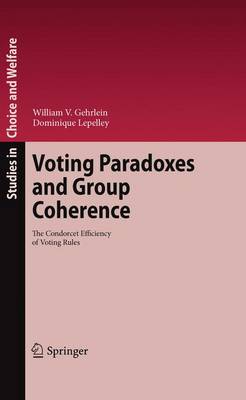The likelihood of observing Condorcet's Paradox is known to be very low for elections with a small number of candidates if voters' preferences on candidates reflect any significant degree of a number of different measures of mutual coherence. This reinforces the intuitive notion that strange election outcomes should become less likely as voters' preferences become more mutually coherent. Similar analysis is used here to indicate that this notion is valid for most, but not all, other voting paradoxes. This study also focuses on the Condorcet Criterion, which states that the pairwise majority rule winner should be chosen as the election winner, if one exists. Representations for the Condorcet Efficiency of the most common voting rules are obtained here as a function of various measures of the degree of mutual coherence of voters' preferences. An analysis of the Condorcet Efficiency representations that are obtained yields strong support for using Borda Rule.
- ISBN13 9783642266102
- Publish Date 2 January 2013 (first published 25 November 2010)
- Publish Status Active
- Publish Country DE
- Publisher Springer-Verlag Berlin and Heidelberg GmbH & Co. KG
- Imprint Springer-Verlag Berlin and Heidelberg GmbH & Co. K
- Edition 2011 ed.
- Format Paperback
- Pages 385
- Language English
